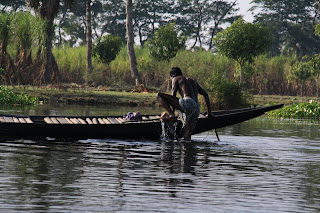

On December 29th Bangladesh will hold it's first national election since the caretaker government took control of the country in 2006.
The official state of emergency was lifted on the 17th of December. Since then the streets have been filled with marches, bands, and loud speakers attached to rickshaws and CNGs all blasting the positions of the election candidates. The energy here is heightened further still by the large presence of military and Rapid Action Battalion patrols roaming the city ensuring that the entire election process goes smoothly.
It is an exciting time to be living in Dhaka right now. Crowds can gather at a moments notice. Peaceful demonstrations can turn heated. No one is sure how the national elections and then subsequent local elections on January 11th will go. All eyes are zeroed in on the two major political party leaders- Khaleda Zia (BNP) and Sheikh Hasina (Awami League). Dhaka has become eerily quiet at night. During the day and into the early evening the sound of marches and rallies fills the air. I have talked with a lot of Bangladeshi's from both sides of the political spectrum. Each one of them is truly excited that the national elections are going to actually take place. Each one of them has also confessed doubt as to the legitimacy and transparency of whichever party ends up winning.
Given the uncertainly and safety surrounding the election VSO has requested that all their volunteers remain at home for the next three days. I will therefore remain, safe and secure, in my own home while the process of democracy unfolds.
It will be very interesting to see what happens next.
